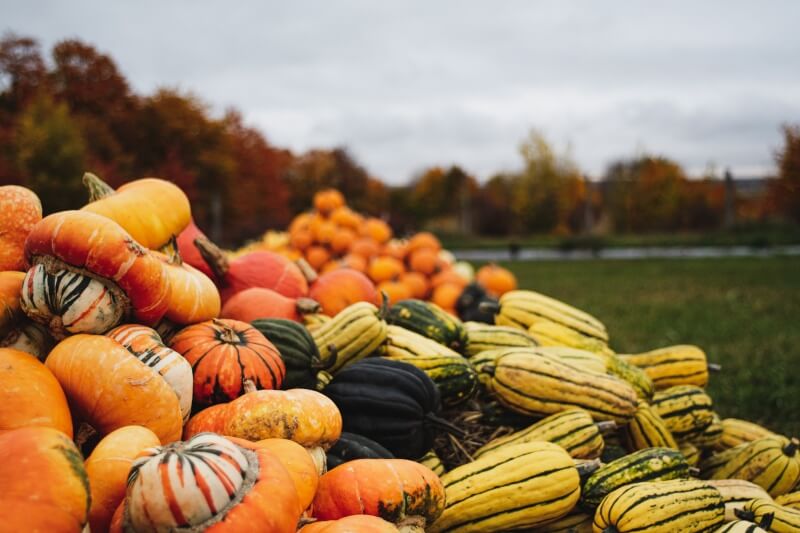- How long is pumpkin season?
- Pumpkin varieties or what to use them in the kitchen
- Health properties or why eat pumpkin
When the days get shorter, the leaves fall from the trees, and vacations become nothing more than a pleasant memory, the gray aura outside the window is offset by the beautiful, colorful vegetables at the stands. Let's take advantage of them, because their colors are not only pleasing to the eye. They also represent very important health benefits for our bodies. Today we invite you to take a look at the beautiful, bright orange pumpkins.
How long is pumpkin season?
Even though the first pumpkins appear on the stands in summer, the actual pumpkin season begins in September and lasts until the first frost. These fall vegetables can be stored for several months. You just need to provide them with the right conditions: room temperature or slightly lower.
Extend the pumpkin season by processing it properly. Pumpkin is suitable for freezing, for example, diced or in the form of a ready-made mousse. Pumpkin preparations such as jams or pumpkin in vinegar are also popular.
Pumpkin varieties or what to use them in the kitchen
Pumpkins have been gaining popularity in recent years, which is why new varieties are becoming increasingly popular. The most well-known and widely available is the giant pumpkin, also known as the Polish pumpkin. This variety is familiar to us from Halloween decorations. However, there's nothing stopping it from being used in the kitchen. It doesn't have a distinct flavor, so it's worth seasoning accordingly.
The Japanese Hokkaido pumpkin is equally popular. It is smaller and has a more intense color and flavor. It has a nutty note. It's well-suited for soups, cakes, and pancakes. It's often used in cooking because it doesn't require peeling, making food preparation much easier.
Butternut squash is pear-shaped and lighter in color than traditional orange varieties. The second variety is green. It's suitable for many dishes, such as mashed potatoes, baked fries, and soups. It can also be eaten raw.
Pasta squash has also recently become increasingly popular. It's oblong, bright orange or yellow-green. Its name comes from its characteristic flesh, which resembles tiny strands of broth noodles. An interesting idea is to mix it with traditional pasta or use it in a salad.
Health properties or why eat pumpkin
Pumpkins are low in calories, with only about 30 kcal per 100 g. They consist mainly of carbohydrates, with little protein and almost no fat. Pumpkin seeds and pumpkin seed oil are rich in fat. Both products are worth including in our diets due to their significant health benefits.
The vegetable itself is a good source of fiber, essential for the proper functioning of our bodies, especially the intestines. For this reason, pumpkin is recommended for constipation. Pumpkin juices and mousses, in turn, have a diuretic effect, which is why they are recommended for certain kidney diseases.
The intense colors of pumpkin aren't just beautiful to look at. They also indicate a high content of beta-carotene, an antioxidant that has a positive effect on our health. Antioxidants fight excessive amounts of free radicals in our bodies. Thanks to their consumption, we reduce the risk of certain types of cancer, reduce inflammation, and slow the aging process.
The already mentioned beta-carotene is converted into vitamin A in our body, which has a very positive effect on vision, especially vision at dusk.
One of the very important properties of pumpkin is its ability to regulate blood pressure and cholesterol levels.
People on a restrictive diet should include pumpkin in their diet. It contains few calories but a high amount of satiating fiber. However, be careful if you also have problems with carbohydrate economy. On the one hand, eating pumpkin can help regulate blood sugar levels. On the other hand, baked or boiled pumpkin, in particular, has a high glycemic index. People with diabetes or insulin resistance can still consume pumpkin. However, it should be a one-time, small portion in a properly prepared meal that includes healthy sources of protein and fat.
THE PUBLISHER'S CHOICE
Dried dates 1 kg BIOGO
- €4,21
€4,95- €4,21
- Unit price
- / per
Almonds 1 kg BIOGO
- €11,69
€13,75- €11,69
- Unit price
- / per
Peeled sunflower seeds 1 kg BIOGO
- €3,04
€3,57- €3,04
- Unit price
- / per
Dried organic mango 400 g BIOGO
- €10,99
- €10,99
- Unit price
- / per
Dried White Mulberries 500 g ORGANIC
- €5,84
€6,87- €5,84
- Unit price
- / per
Popcorn (corn kernels) organic 1 kg BIOGO
- €5,84
- €5,84
- Unit price
- / per
Organic Ground Turmeric 500 g BIOGO
- €5,92
- €5,92
- Unit price
- / per
Milk thistle seeds 1 kg BIOGO
- €3,99
- €3,99
- Unit price
- / per
Organic cashew nuts 1 kg BIOGO
- €19,99
- €19,99
- Unit price
- / per
Unpeeled buckwheat groats 1 kg BIOGO
- €2,81
€3,31- €2,81
- Unit price
- / per







































































































































